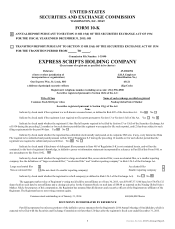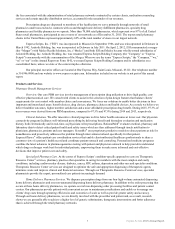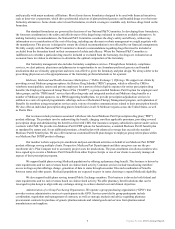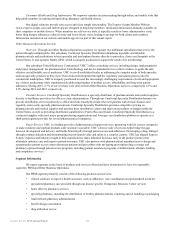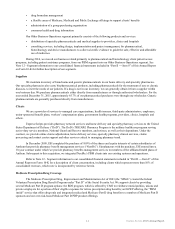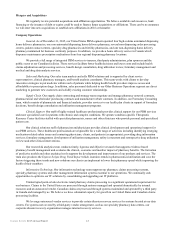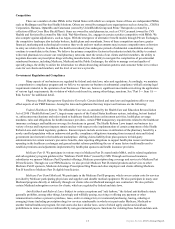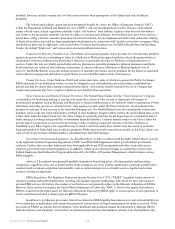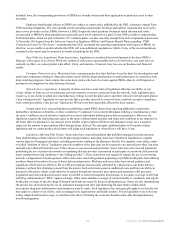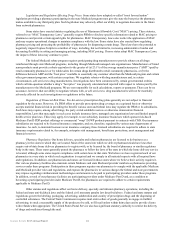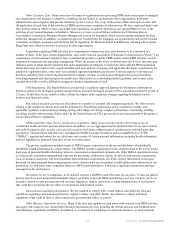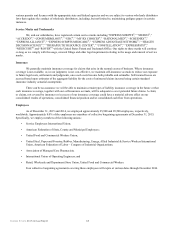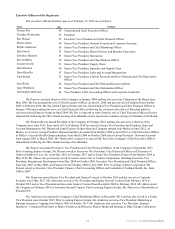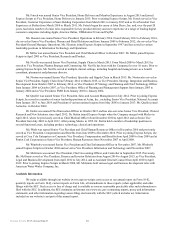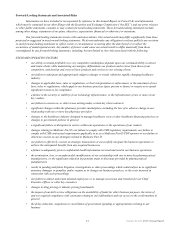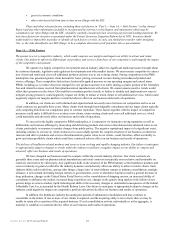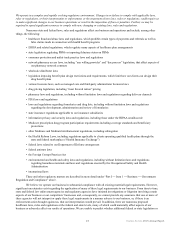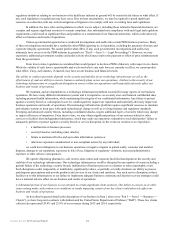Medco 2015 Annual Report Download - page 16
Download and view the complete annual report
Please find page 16 of the 2015 Medco annual report below. You can navigate through the pages in the report by either clicking on the pages listed below, or by using the keyword search tool below to find specific information within the annual report.14
Express Scripts 2015 Annual Report
kickback laws may include criminal and civil fines and exclusion from participation in the federal and state healthcare
programs.
The federal anti-kickback statute has been interpreted broadly by courts, the Office of Inspector General (“OIG”)
within the Department of Health and Human Services (“HHS”), and various administrative bodies. Because of the federal
statute’s broad scope, federal regulations establish certain “safe harbors” from liability. A practice that does not fall within a
safe harbor is not necessarily unlawful, but may be subject to scrutiny and challenge. Anti-kickback laws have been cited as a
partial basis, along with state consumer protection laws described below, for investigations and multi-state settlements relating
to financial incentives provided by drug manufacturers to pharmacies in connection with “product conversion” programs. Other
anti-kickback laws may be applicable, such as the Public Contracts Anti-kickback Act, the ERISA Health Plan Anti-kickback
Statute, the federal “Stark Law” and various other state anti-kickback restrictions.
Federal Civil Monetary Penalties Law. The federal civil monetary penalty statute provides for civil monetary penalties
against any person who gives something of value to a Medicare or Medicaid program beneficiary which the person knows or
should know is likely to influence the beneficiary’s selection of a particular provider for Medicare or Medicaid items or
services. Under this law, our wholly-owned home delivery pharmacies, specialty pharmacies, infusion pharmacies and home
health providers are restricted from offering certain items of value to influence a Medicare or Medicaid patient’s use of
services. The Health Reform Laws also include several civil monetary provisions, such as penalties for the failure to report and
return a known overpayment and failure to grant timely access to the OIG under certain circumstances.
Prompt Pay Laws. Under Medicare Part D and certain state laws, some of which also govern the Public Exchanges,
PBMs and many of our health plan clients, we may be obligated to pay retail pharmacy providers within established time
periods that may be shorter than existing contracted terms and/or via electronic transfer instead of by check. Changes that
require faster payment may have a negative impact on our cash flow from operations.
False Claims Act and Related Criminal Provisions. The federal False Claims Act (the “False Claims Act”) imposes
civil penalties for knowingly making or causing to be made false claims or false records or statements with respect to
governmental programs, such as Medicare and Medicaid, to obtain reimbursement or for failure to return overpayments. Private
individuals may bring qui tam or “whistle blower” suits against providers under the False Claims Act, which authorizes the
payment of a portion of any recovery to the individual bringing suit. The Health Reform Laws also amended the federal anti-
kickback laws to state any claim submitted to a federal or state healthcare program which violates the anti-kickback laws is also
a false claim under the False Claims Act. The False Claims Act generally provides for the imposition of civil penalties and for
treble damages, resulting in the possibility of substantial financial liabilities. Criminal statutes similar to the False Claims Act
provide that if a corporation is convicted of presenting a claim or making a statement it knows to be false, fictitious or
fraudulent to any federal agency the corporation may be fined. Conviction under these statutes may also result in exclusion
from participation in federal and state healthcare programs. Many states have also enacted laws similar to the False Claims Act,
some of which may include criminal penalties, substantial fines and treble damages.
Government Procurement Regulations. As described above, we have a contract with the DoD, which subjects us to all
of the applicable Federal Acquisition Regulations (“FAR”) and DoD FAR Supplement which govern federal government
contracts. Further, there are other federal and state laws applicable to our DoD arrangement and other clients that may be
subject to government procurement regulations. In addition, certain of our clients participate as contracting carriers in the
Federal Employees Health Benefits Program administered by the Office of Personnel Management, which includes various
PBM standards.
Antitrust. The antitrust laws generally prohibit competitors from fixing prices, dividing markets and boycotting
competitors, regardless of the size or market power of the companies involved. Further, antitrust laws generally prohibit other
conduct found to restrain competition unreasonably, such as certain attempts to tie or bundle services together and certain
exclusive dealing arrangements.
ERISA Regulation. The Employee Retirement Income Security Act of 1974 (“ERISA”) regulates certain aspects of
employee pension and health benefit plans, including self-funded corporate health plans, with which we have agreements to
provide PBM services. We believe the conduct of our business is not generally subject to the fiduciary obligations of ERISA.
However, there can be no assurance the United States Department of Labor (the “DOL”), which is the agency that enforces
ERISA, would not in the future assert the fiduciary obligations imposed by ERISA apply to certain aspects of our operations or
courts would not reach such a ruling in private ERISA litigation.
In addition to its fiduciary provisions, federal law related to ERISA health plans imposes civil and criminal liability on
service providers to health plans and certain other persons if certain forms of illegal remuneration are made or received. These
provisions of ERISA are similar, but not identical, to the healthcare anti-kickback statutes described above, although ERISA
lacks the statutory and regulatory “safe harbor” exceptions incorporated into the healthcare statutes. Like the healthcare anti-



